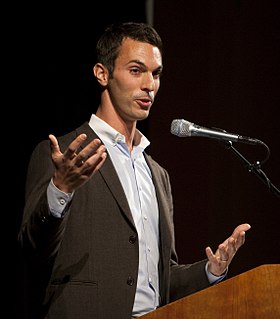A Quote by John Darnielle
The South actually has a very strong tradition of activism. The civil rights movement came from down here! It was black activists demanding that their voices be heard. People say these are red states. No they're not!
Related Quotes
The gay rights movement of recent years has been an inspiring victory for humanity and it is in the tradition of the civil rights movement when I was a young boy in the South, the women's suffrage movement when my mother was a young woman in Tennessee, the abolition movement much farther back, and the anti-apartheid movement when I was in the House of Representatives. All of these movements have one thing in common: the opposition to progress was rooted in an outdated understanding of morality.
We need to reshape the movement as one of grassroots activists, and not 'professional activists' who populate the seemingly endless number of national animal rights groups. For many people, activism has become writing a check to a national group that is very pleased to have you leave it to them. Although it is important to give financial support to worthy efforts only, giving money is not enough and giving to the wrong groups can actually do more harm than good.
My friends, to those who say that we are rushing this issue of civil rights, I say to them we are 172 years late. To those who say that this civil-rights program is an infringement on states’ rights, I say this: The time has arrived in America for the Democratic Party to get out of the shadow of states' rights and to walk forthrightly into the bright sunshine of human rights.
The civil rights movement didn't deal with the issue of political disenfranchisement in the Northern cities. It didn't deal with the issues that were happening in places like Detroit, where there was a deep process of deindustrialization going on. So you have this response of angry young people, with a war going on in Vietnam, a poverty program that was insufficient, and police brutality. All these things gave rise to the black power movement. The black power movement was not a separation from the civil rights movement, but a continuation of this whole process of democratization.
In the South, prior to the Civil Rights movement and the 1964 Civil Rights Act, democracy was the rule. The majority of people were white, and the white majority had little or no respect for any rights which the black minority had relative to property, or even to their own lives. The majority - the mob and occasionally the lynch mob - ruled.
In less than a century we experienced great movement. The youth movement! The labor movement! The civil rights movement! The peace movement! The solidarity movement! The women's movement! The disability movement! The disarmament movement! The gay rights movement! The environmental movement! Movement! Transformation! Is there any reason to believe we are done?
For many years now, I have been an outspoken supporter of civil and human rights for gay and lesbian people. Gays and lesbians stood up for civil rights in Montgomery, Selma, in Albany, Ga. and St. Augustine, Fla., and many other campaigns of the Civil Rights Movement. Many of these courageous men and women were fighting for my freedom at a time when they could find few voices for their own, and I salute their contributions.
Particularly black Americans, many of them, from quotes that I have seen and conversations I've had, are sort of insulted that the civil rights movement is being hijacked - the rhetoric of the civil rights movement is being hijacked for something like same sex marriage. Black Americans tend to have a higher degree of religiosity.
The core of human rights work is naming and shaming those who commit abuses, and pressuring governments to put the screws to abusing states. As a result, human rights conventions are unique among international law instruments in depending for their enforcement mostly on the activism of a global civil society movement.
Generally, the arguments for same-sex marriage go along these lines: 'I have a civil right.' What the homosexual movement wants to do is to hitch their agenda to the civil rights movement, but I point out that this is illegitimate for a number of reasons. Number one, no black person has ever left his black-ness or changed his black-ness, but plenty of people have come out of the homosexual movement. What we need to do is distinguish between race and behavior.
The great social justice changes in our country have happened when people came together, organized, and took direct action. It is this right that sustains and nurtures our democracy today. The civil rights movement, the labor movement, the women's movement, and the equality movement for our LGBT brothers and sisters are all manifestations of these rights.







































